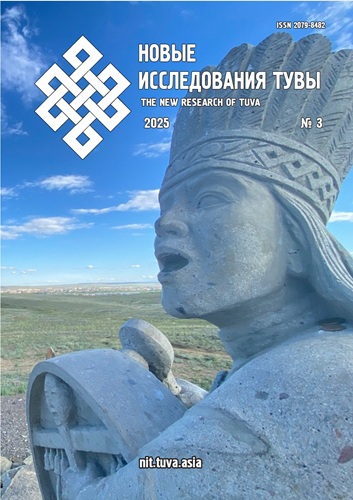Features of the Development of Tatar Soviet Prose: Thematic and Poetic Tendencies
DOI:
https://doi.org/10.25178/nit.2025.3.7Keywords:
Tatar literature; prose; socialist realism; Soviet literatureAbstract
This article examines the distinctive features of Tatar Soviet prose in terms of thematic and poetic innovation. Its development is marked by three major stages: the first — 1917–1930, the second — 1941–1955, and the third — 1960–1985. These stages correspond to socio-political processes in the USSR and to changing emphases in artistic consciousness and the literary process. The analysis is based on the works of G. Ibragimov, A. Eniki, G. Bashirov, M. Amir, F. Khusni, and R. Batulla. The authors highlight the transformation of the “We — They” dichotomy at each stage.
During the initial stage of the formation of Soviet artistic culture, literature absorbed the romantic pathos of the revolution and civil war. Under ideological pressure, socialist realism was established as the dominant literary method, based on a dichotomy of “We” — fighters for a new socialist life, and “They” — enemies of Soviet power.
In the period of the Great Patriotic War, significant thematic transformations took place. Efforts to depict ethnic characters, attempts to recreate the Tatar national character, and the development of psychological poetics reflected writers' aspirations to overcome the ideological constraints of socialist realism. As in the literary contexts across the Soviet Union, the representation of “We” now referred to the people of the USSR — defenders of their homeland — and “They” to the enemy, the aggressors.
The third stage is characterized by a revival of established traditions in Tatar prose and the reemergence of the theme of ethnic identity in literary works. In line with the sociocultural changes in the life of the Tatar people, prose became increasingly diverse in terms of both themes and genres. The socio-psychological opposition of “We — They” came to be interpreted within an ethnocultural framework.
During this period, the pursuit of ethnic self-expression, humanist ideals, and the search for artistic truth often came into conflict with the rigid ideological boundaries, censorship, and political pressure. Nevertheless, Tatar literature managed to endure, preserve its distinct identity, and make a significant contribution to the development of Tatar culture.
References
Baevsky, V. S. (1999) History of Russian Literature of the 20th Century. Moscow, Languages of Russian Culture. 271 p. (In Russ.)
Gainullina, G. R. (2012) Development of Tatar Autobiographical Prose in the 1960s–1970s. Kazan, Ikhlas. 107 p. (In Tatar.)
Galimullin, F. G. (2016) Tatar Literature: A View Through the Centuries. Kazan, Editorial and Publishing Centre “Shkola”. 295 p. (In Russ.)
Gallyamova, G. A. (2015) The Tatar ASSR During the Post-Stalinist Period (1945–1985). Kazan, Tatar Book Publishing House. 455 p. (In Russ.)
Ganieva, A. F. (2022) The Archetype of the Mother as Guardian of National Identity in Tatar Prose. Vestnik Udmurtskogo universiteta. Seriya Istoriya i filologiya, vol. 32, no. 3, pp. 623–629. (In Russ.) DOI: https://doi.org/10.35634/2412-9534-2022-32-3-623–629
Ganieva, R. K. (2002) Tatar Literature: Traditions and Connections. Kazan, Kazan University Press. 272 p. (In Russ.)
Zagidullina, D. F. (2020) Tatar Literature of the 20th — Early 21st Century: The “Softness” of Modernism, Avant-Garde and Postmodernism (Problem Statement). Kazan, IYALI. 256 p. (In Russ.)
Zakirzyanov, A. M. (2019) Contemporary Tatar Literary Studies: Traditions, Patterns, Searches. Kazan, G. Ibragimov Institute of Language, Literature and Art. 372 p. (In Russ.)
Zahidullina, D. F. (2015) Tatar Literature of the 1960s–1980s: Fields of Renewal and Avant-Garde Explorations. Kazan, Tatar Book Publishing House. 383 p. (In Tatar.)
Musin, F. M. (1976) By the Coordinates of Life: Reflections on Contemporary Tatar Prose. Moscow, Sovremennik. 205 p. (In Russ.)
Nadyrshina, L. R. (2022) The Poem in 20th Century Tatar Literature. Kazan, G. Ibragimov Institute of Language, Literature and Art. 352 p. (In Russ.)
Nigmatullina, Y. G. (1997) Types of Cultures and Civilizations in the Historical Development of Tatar and Russian Literature. Kazan, Fän. 189 p. (In Russ.)
Skorospelova, E. B. (2003) Russian Prose of the 20th Century: From A. Bely (“Petersburg”) to B. Pasternak (“Doctor Zhivago”). Moscow, TEIS. 420 p. (In Russ.)
History of Tatar Literature (2021): in 8 volumes / compiled and edited by G. M. Davletshin. Kazan, Tatar Book Publishing House. Vol. 1: Ancient and Medieval Period. 423 p. (In Tatar.)
Fakhrutdinov, R. G. and Fakhrutdinov, R. R. (2021) History of the Tatar People. Kazan, Tatar Book Publishing House. 415 p. (In Russ.)
Khatipov, F.M. (2014) The Aesthetic Energy of the Literary Work. Kazan: Tatar Book Publishing House, 287 p. (In Tatar.)
Chetvrova, L. B. and Sakharov, A. S. (2023) “Village Prose” in the Context of the Clash Between Traditional Russian Culture and Soviet Modernity. Semioticheskie issledovaniya, vol. 3, no. 2, pp. 99–106. (In Russ.) DOI: https://doi.org/10.18287/2782-2966-2023-3-2-99-106
Published
How to Cite
For citation:
Ganieva A. F. and Nadyrshina L. R. Features of the Development of Tatar Soviet Prose: Thematic and Poetic Tendencies. New Research of Tuva, 2025, no. 3, pp. 94-111. (In Russ.). DOI: https://doi.org/10.25178/nit.2025.3.7
Issue
Section

This work is licensed under a Creative Commons Attribution-NonCommercial 4.0 International License.

Author(s) license holder(s) grant rights for their work to the journal (grantee of a license) under the simple non-exclusive open license in accordance with Art. 1286.1 «Open license for a research work, work of literature or fine arts», Civil Code of the Russian Federation.
New Research of Tuva publishes articles under the Creative Commons Attribution-NonCommercial license (CC BY-NC).
Since it is an open license, author(s) reserve the right to upload the article to their institutional repository, submit it to another journal (if it allows republications), or republish it on their own website (in full, or in part).
However, several conditions apply here:
a) The republished version must always contain the name(s) and affiliation(s) of the author(s), the original title and the hyperlink to the original version on the New Research of Tuva website;
b) It must be in open access, free of charge, and no category of readers must be in any way whatsoever advantaged over general readership.
c) should the contribution be submitted elsewhere by its author(s) without substantial modification (30% or more of original text unchanged), the body of the article should contain a disclaimer that the original version was published in New Research of Tuva (with a link to the respective page)
The CC-BY-NC is a non-revocable license which applies worldwide and lasts for the duration of the work’s copyright.










